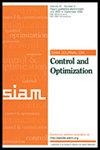Nonconservative Stability Criteria for Semi-Markovian Impulsive Switched Systems
IF 2.4
2区 数学
Q2 AUTOMATION & CONTROL SYSTEMS
引用次数: 0
Abstract
SIAM Journal on Control and Optimization, Volume 62, Issue 3, Page 1783-1808, June 2024.Abstract. This paper proposes criteria for establishing the asymptotic moment stability of semi-Markovian impulsive switched systems. Under some mild assumptions, we formulate an auxiliary linear time-delayed system based on the Lyapunov characterizations of the subsystems and impulses, as well as the properties of the underlying semi-Markovian impulsive switching signal. Our main result provides an upper bound on the moment, which is directly related to a solution of the aforementioned linear time-delayed system. Specifically, the semi-Markovian impulsive switched system is asymptotically moment stable if the auxiliary linear time-delayed system is asymptotically stable. In situations where the mode-dependent sojourn time distributions of the underlying impulsive switching signals are all exponential, uniform, or trigonometric, we deduce explicit formulae for the auxiliary linear time-delayed systems. To prove the main result, we compute the expected gain function, which requires formulating a generalized renewal equation. Finally, we test our stability criteria on a numerical example in different scenarios and show that our stability results are nonconservative compared to the statistically obtained average of state-norms and state-norm-squares.
半马尔可夫冲动开关系统的非保守稳定标准
SIAM 控制与优化期刊》第 62 卷第 3 期第 1783-1808 页,2024 年 6 月。 摘要本文提出了建立半马尔可夫冲动开关系统渐近矩稳定性的准则。在一些温和的假设条件下,我们基于子系统和脉冲的 Lyapunov 特性以及底层半马尔可夫脉冲切换信号的特性,提出了一个辅助线性延时系统。我们的主要结果提供了矩的上界,它与上述线性延时系统的解直接相关。具体来说,如果辅助线性延时系统是渐近稳定的,那么半马尔可夫脉冲切换系统就是渐近矩稳定的。在底层脉冲切换信号的与模式相关的停留时间分布都是指数分布、均匀分布或三角分布的情况下,我们推导出了辅助线性延时系统的显式。为了证明主要结果,我们计算了预期增益函数,这需要提出一个广义更新方程。最后,我们在不同场景下的一个数值示例中测试了我们的稳定性标准,结果表明,与统计得出的状态正态和状态正态平方的平均值相比,我们的稳定性结果并不保守。
本文章由计算机程序翻译,如有差异,请以英文原文为准。
求助全文
约1分钟内获得全文
求助全文
来源期刊
CiteScore
4.00
自引率
4.50%
发文量
143
审稿时长
12 months
期刊介绍:
SIAM Journal on Control and Optimization (SICON) publishes original research articles on the mathematics and applications of control theory and certain parts of optimization theory. Papers considered for publication must be significant at both the mathematical level and the level of applications or potential applications. Papers containing mostly routine mathematics or those with no discernible connection to control and systems theory or optimization will not be considered for publication. From time to time, the journal will also publish authoritative surveys of important subject areas in control theory and optimization whose level of maturity permits a clear and unified exposition.
The broad areas mentioned above are intended to encompass a wide range of mathematical techniques and scientific, engineering, economic, and industrial applications. These include stochastic and deterministic methods in control, estimation, and identification of systems; modeling and realization of complex control systems; the numerical analysis and related computational methodology of control processes and allied issues; and the development of mathematical theories and techniques that give new insights into old problems or provide the basis for further progress in control theory and optimization. Within the field of optimization, the journal focuses on the parts that are relevant to dynamic and control systems. Contributions to numerical methodology are also welcome in accordance with these aims, especially as related to large-scale problems and decomposition as well as to fundamental questions of convergence and approximation.

 求助内容:
求助内容: 应助结果提醒方式:
应助结果提醒方式:


